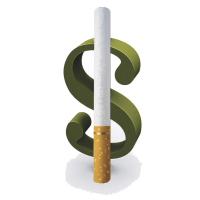Obama Administration Accused of Bowing to Tobacco Industry in Secret Trade Talks

Public health advocates, anti-tobacco activists and corporate watchdog groups are criticizing the Obama administration for capitulating to big tobacco lobbyists by gutting a proposal to ensure that the Trans-Pacific Partnership (TPP) cannot be used to undermine anti-smoking laws and regulations.
The TPP is a broad trade treaty being negotiated—in secret—by the U.S. and 11 other countries with a total population of 800 million, including Australia, Brunei, Canada, Chile, Japan, Malaysia, Mexico, New Zealand, Peru and Singapore. Critics point out that some draft provisions would allow corporations to obtain rulings striking down laws that restrict trade, thus undermining their sovereignty and frustrating democratic government.
That sort of thing is already happening under other treaties. Treaty protections for intellectual property are being used by Philip Morris International and British American Tobacco to bring a case in Australian court attacking an Australian law requiring that cigarettes be sold in generic packs, and they have paid legal fees for three countries—Ukraine, Honduras and Dominican Republic—to challenge the law before the World Trade Organization.
Last year, the Office of U.S. Trade Representative (USTR) Ron Kirk proposed a “safe harbor” provision protecting tobacco regulations because of “the unique status of tobacco products from a health and regulatory perspective.” This language, according to New York Mayor Michael Bloomberg, would have prevented the tobacco industry from “interfering with governments’ sovereign right to protect public health through tobacco control laws.”
But the tobacco industry, big business groups (including the U.S. Chamber of Commerce, the Emergency Committee for American Trade, and the National Association of Manufacturers) and tobacco state congressmen denounced the proposal, calling it a slippery slope that could allow countries to restrict trade in other products vital to U.S. trade. In 2012, exports of tobacco products totaled about $1.6 billion, down from $2.3 billion in 2007.
The Obama administration—which regularly dismisses criticism by those to its left with ease—followed its usual pattern of bending over backward to allay corporate concerns. USTR abandoned its original proposal and offered far more limited language at the outset of negotiations in Bandar Seri Begawan, Brunei.
The new language states that all trade agreements recognize the authority of countries to protect human life or health, including by regulating tobacco, and will require that before one member country challenges another’s tobacco regulations, health officials of both nations must meet to discuss the issue.
A statement by five groups, including the American Academy of Pediatrics, American Heart Association, and American Cancer Society, voiced bitter dismay with the new proposal, calling it a “missed opportunity for the United States to lead the fight against this global epidemic.”
In a New York Times op-ed, Bloomberg described the new proposal as “weak half-measures at best that will not protect American law—and the laws of other countries—from being usurped by the tobacco industry, which is increasingly using trade and investment agreements to challenge domestic tobacco control measures.”
-Matt Bewig
To Learn More:
Why Is Obama Caving on Tobacco? (by Michael Bloomberg, New York Times)
Obama Administration Attacked for Retreat on Tobacco in Trade Talks (by Myron Levin, Fair Warning)
Proposed Obama Trade Agreement would Ban Buy America Laws (by Noel Brinkerhoff, AllGov)
Secret Obama Trade Agreement Would Allow Foreign Corporations to Avoid U.S. Laws (by Noel Brinkerhoff, AllGov)
- Top Stories
- Unusual News
- Where is the Money Going?
- Controversies
- U.S. and the World
- Appointments and Resignations
- Latest News
- Trump to Stop Deportations If…
- Trump Denounces World Series
- What If China Invaded the United States?
- Donald Trump Has a Mental Health Problem and It Has a Name
- Trump Goes on Renaming Frenzy






Comments